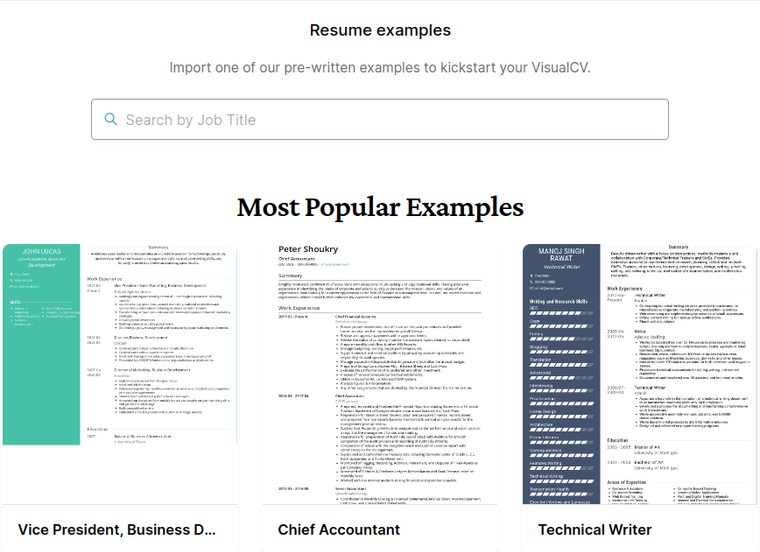
19 Action Verbs That Convey Leadership & Responsibility

With an average of 200 resumes submitted per job posting, getting your resume seen by a recruiting team can feel like you're a needle waiting to be found in a haystack. If that's not enough to make it seem as if you're climbing the job search mountain without an end in sight, statistics also show that recruiters spend a very brief six seconds reviewing a resume before deciding if it should go in the "interview" pile or the "trash" pile.
So, if you want your resume to stand out, it needs to speak to the recruiter within six seconds. Using effective actions verbs can make all the difference!
Browse our gallery of resume examples here.

Placement of Action Verbs Is Key
Recruiters often read the first sentence or two of your resume and merely skim the rest. Given that we read from left to right, they will focus their attention on the left-hand side of the page. To catch the recruiter's attention, each bullet point in your relevant work experience section should begin with an effective action verb.
Further, applicant tracking systems are often programmed to pick up specific action verbs outlined in the job description. Incorporating some of these keywords into your resume will help your resume get past the bots and into the hands of a recruiter.
The Right Action Verbs Help Tell Your Story
Your resume should tell a story about your accomplishments. What challenges did you face and overcome? What goals did you achieve and exceed? How did you accomplish what you did?
When used effectively, the right actions verbs help you tell your story. They shed light on what you did to achieve your accomplishments and the steps you took to overcome challenges and obstacles.
Browse our gallery of resume templates here.

Highlight Your Ability to Lead in Resume
When selecting the right action verbs to update your resume, highlighting your leadership ability is a must, especially if you are looking to advance your career and move up the ladder. You should also emphasize the fact that you are a responsible and dedicated employee. How can you make your resume stand out and convey leadership and responsibility? By strategically using the right action words throughout your resume.
What are weak action verbs in resume?
Weak action verbs in resume are “assisted in”, “coordinated with”, “responsible for”, “oversaw”, “led”, “dabbled”, “managed” to name a few. Consider picking up better alternatives to avoid using these weak action verbs in your resume.
What are good action verbs for a resume?
Some good action verbs for a resume that display leadership are:
- Spearheaded
- Established
- Developed
- Mentored
- Budgeted
- Negotiated
- Executed
- Drove Growth
- Advocated
- Pioneered
- Transformed
- Persuaded
- Galvanized
- Engineered
- Implemented
- United
- Diagnosed
- Increased
- Motivated
Leadership Actions Verbs That Say "I'm a Leader"
1. Spearheaded - Leadership Action Verb
The word "spearheaded" screams leadership and responsibility. Initiative and innovative thinking are necessary to effectively spearhead a project, as is the competence to oversee the processes involved. "Spearheaded" is a more descriptive verb to use in place of terms such as "oversaw" or "led."
2. Established - Leadership Action Verb
"Established" has a non-threatening but authoritative ring to it. It is also a more descriptive choice than "started" or "began."
3. Developed - Leadership Action Verb
"Developed" not only indicates leadership and responsibility, it also says that you are a creative individual who can come up with solutions.
4. Mentored - Leadership Action Verb
The future of any organization rests on its development of younger generations. Companies like to hire people who take an interest in not only developing themselves, but others as well, and mentoring is a great way to do that.
5. Budgeted - Leadership Action Verb
"Budgeted" is a term that evokes both leadership and expertise. Employees who oversee budgets are in positions of great responsibility.
6. Executed - Leadership Action Verb
Successfully executing tasks requires initiative and follow-through. This is a great word to use in place of "started" on a resume.
7. Drove Growth - Leadership Action Verb
Visionaries and leaders know how to motivate teams to drive growth. This trait is especially valuable in sales and marketing positions.
8. Negotiated - Leadership Action Verb
Compromise isn’t easy. Leaders must know when it's appropriate to negotiate. Effective negotiation is an important skill, whether it refers to brokering important deals, securing contracts, or simply working with other people.
9. Advocated - Leadership Action Verb
When you advocate for something, you and show personal interest and investment. The word also has positive connotations because it is often associated with a good cause (i.e., an advocate for equal rights, wellness advocate).
10. Pioneered - Leadership Action Verb
The word "pioneered" takes the reader back to the pioneer days when it took great determination to come up with ways to survive and thrive. "Pioneered" is a great term to use to indicate that you are a leader with vision and the ability to innovate.
11. Transformed - Leadership Action Verb
You might choose to use the action verb "transformed" instead of the word "changed" because "transformed" will have more impact on the reader. To transform something requires power and influence.
12. Persuaded - Leadership Action Verb
Think about the type of person who could persuade you to do something. You would likely describe that person as trustworthy, charismatic, or influential, all traits that are valuable in leaders.
13. Galvanized - Leadership Action Verb
It takes an inspiring leader to galvanize, or excite, a team into action. Plus, "galvanized" is not a commonly used word on resumes, so using it could help your resume stand out from other resumes.
14. Engineered - Leadership Action Verb
"Engineered" is not a commonly used term on resumes, yet it is very descriptive. To engineer something can mean to innovate, create, design or develop, all traits that are valued by employers.
15. Implemented - Leadership Action Verb
The term "implemented" indicates that you are dedicated and a self-starter with the ability to see things through.
16. United - Leadership Action Verb
Even under adverse circumstances, it is essential for a leader to be able to unite individuals, departments, and teams. The term “united” can also show that you are a team player and appreciate the value of cooperation.
17. Diagnosed - Leadership Action Verb
The term "diagnosed" is a better way to articulate "I figured out how/why..." on a resume. People turn to others to "diagnose" their problems (think mechanics for cars and doctors for illnesses), and similarly, organizations like to hire individuals they can count on to diagnose issues and provide solutions.
18. Increased - Leadership Action Verb
“Increased” may be the action verb most commonly used on resumes listed in this post, but it is still a good term to use on your resume to show success and results. Support it with quantitative results: "Increased output of X by XX%."
19. Motivated - Leadership Action Verb
The ability to motivate is an important leadership quality that companies look for in potential employees. Circumstances frequently change in business, and leaders must motivate their coworkers through both the good times and the bad.
Action Verbs and Phrases to Avoid in a Leadership Resume
Certain action verbs are overused on resumes. "Led" and "oversaw" are two examples that, while passable, have better alternatives such as "engineered," "executed" and "motivated." It is acceptable to use these words in one or two instances on your resume, but push yourself to come up with better alternatives when possible to help your resume stand out.
Other verbs simply shouldn't be used. For example, "dabbled" sounds wishy-washy and unserious. Remember, you are telling your story to recruiters and hiring managers. Using the right action verbs to support your narrative will do wonders to help you get past the gatekeepers and into the room for a face-to-face interview.
- Placement of Action Verbs Is Key
- The Right Action Verbs Help Tell Your Story
- Highlight Your Ability to Lead in Resume
- What are weak action verbs in resume?
- What are good action verbs for a resume?
- Leadership Actions Verbs That Say "I'm a Leader"
- Action Verbs and Phrases to Avoid in a Leadership Resume

Written By
James Clift
Co-Founder & Director
James is an entrepreneur and the Co-Founder of VisualCV. He has spent the last 10 years building businesses, from window cleaning to software. His passion is helping individuals create the careers they want.
![The 2025 Resume Writing Guide [+ Job Search Tips and Resume Examples]](/static/0a451b7c20b67c3a0ce6a7b4a7680f5f/61ca5/Resume_Guide.jpg)
The 2025 Resume Writing Guide is filled with quality job search tips, resume examples and information you need to know before writing your resume or CV.
January 3, 2025
Read Post

VP Marketing & Resume Expert

Learn how your resume can beat the applicant tracking system (ATS) with keywords and the right resume template.
February 7, 2022
Read Post

Community Success Manager & CV Writing Expert

The top hiring and human resource statistics for 2025, including data on AI resumes, job interviews, remote work, and recruiting.
January 1, 2025
Read Post

Community Success Manager & CV Writing Expert
Copyright ©2025 Workstory Inc.